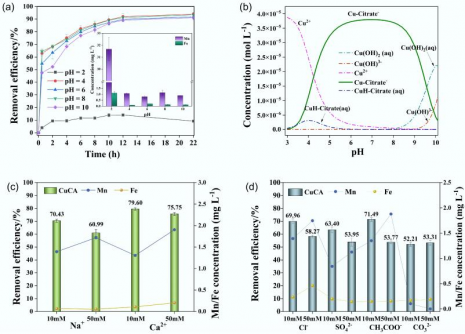A recent breakthrough in wastewater treatment has emerged from research conducted by a team led by Wenhong Fan at Beihang University. Their study, published on October 14, 2025, in the journal Biochar X, presents a modified biochar material known as FMBC-600. This innovative substance has demonstrated an impressive capability to remove copper from water, achieving a remarkable 99.5% removal rate, while also reducing total organic carbon by 92.6%.
Wastewater management has become increasingly critical as freshwater resources dwindle globally. Traditional treatment methods often struggle to address stable metal complexes, particularly those formed with organic agents such as citric acid. These complexes are prevalent in various industries, including electroplating and textile dyeing, and pose significant ecological and health risks. Conventional methods, which primarily target free metal ions, frequently fail to effectively eliminate these problematic compounds.
The research team developed FMBC-600 through a process that involves impregnating biochar with ferromanganese oxide, followed by high-temperature calcination. Characterization techniques, including FE-SEM, EDS, FTIR, and XRD, validated the successful modification of the biochar. The incorporation of nanoparticles measuring between 80 and 100 nanometers transformed the biochar’s surface, enhancing its adsorption capabilities.
In laboratory tests, FMBC-600 exhibited exceptional performance in removing copper-citrate complexes from water. The optimized conditions for maximum efficiency included an iron-to-manganese ratio of 1:4 and a manganese concentration of 0.03 M during pyrolysis at 600 °C. Under these conditions, the adsorption process was rapid, with significant removal occurring within just 30 minutes.
The stability of FMBC-600 across a pH range of 4 to 10 further underscores its practical applicability. Even in the presence of competing ions such as sodium, calcium, chloride, and sulfate, the biochar maintained its high adsorption performance, indicating strong selectivity and resilience against interference.
Kinetic modeling pointed to a pseudo-second-order equation as the best fit, suggesting that chemisorption is the primary mechanism at work. The Freundlich isotherm model supported the observation of heterogeneous multilayer adsorption, which becomes more effective at elevated temperatures. Notably, regeneration tests revealed that FMBC-600 retained approximately 80% of its adsorption efficiency after two cycles.
The implications of this research extend beyond wastewater treatment. The low-cost and environmentally friendly production of FMBC-600 makes it suitable for large-scale applications, particularly in industries that generate significant metal-laden effluents. Furthermore, its potential for soil remediation offers a promising avenue for reducing heavy metal accumulation in agricultural lands, contributing to enhanced food safety and environmental health.
In summary, the development of ferromanganese oxide-modified biochar represents a significant advancement in the field of sustainable water treatment. The combination of its effective metal removal capabilities, stability, and reusability positions FMBC-600 as a viable solution for tackling persistent heavy metal complexes in wastewater. Integrating this technology into existing treatment frameworks could lead to substantial reductions in metal contamination, aligning with global objectives for clean water and sustainability.
The research received funding support from several organizations, including the National Natural Science Foundation of China, and contributes valuable insights to the growing field of biochar science.







